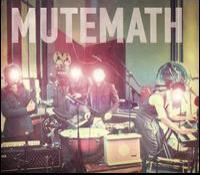In case you hadn't noticed, electro-rock has become one of the trendiest genres in the current music scene. Even bands that wouldn't normally label themselves as such are experimenting with the genre, using drum machines and synthesizes in otherwise straightforward rock songs. Former somewhat metal group Thrice, for instance, incorporated programmed loops and tones into "Red Sky," the closing track on its 2005 album, Vheissu.
Mute Math's self-titled major label debut draws a lot from the sonic landscape of "Red Sky." Though the similarities are likely unintentional, Mute Math, at times, plays like a disc full of spin-offs of that track.
The album opens with the first of four primarily instrumental tracks. "Collapse" is a concise, beat-driven piece that aptly prepares us for the remainder of the album. It runs only slightly over the one-minute mark, yet somehow it is among the record's best.
The next track, "Typical" introduces singer Paul Meany, whose voice is the weakest aspect of the band. It combines the banality of Thrice singer Dustin Kensrue with the modern, more boring Sting.
The Sting influence is most palpable on "Noticed." Meany's style on the track -- from his tone to the odd way he accents certain syllables -- sounds almost exactly like Sting, circa 1999.
His vocals on "Noticed" are actually somewhat enjoyable in comparison to "Typical" and "Stare at the Sun." Whenever Meany evokes Kensrue, as he does on those songs, he pushes his band into the same trap that Thrice often falls into. Both singers, at times, seem to refuse injecting emotion into their vocals, forcing the listener to listen closely to catch dynamic changes.
Mute Math is at its best when it sticks to the instrumental roots displayed on album closer "Reset." Uninhibited by Meany's vocals, the track pulses and flows flawlessly, leaving us wanting more. Though most mainstream fans would ignore an instrumental band, I would like to see the group further explore the direction taken on "Collapse" and "Reset." It might cost the band its contract with Warner Brothers, but it would be for the best.
Ironically though, the highlight of the disc is not an instrumental. "Stall Out," the album's penultimate track, is the closest thing to epic the band has to offer. It begins innocently, with hushed vocals backed by light synthesizer tones and swelling strings, but soon explodes into a symphony of emotion. As the music builds, Meany provides his best vocals on the album, chanting "we are still far from over," perfectly echoing the emotion in the song's lyrics.
I can only imagine how amazing the song would be with a better singer, though.
